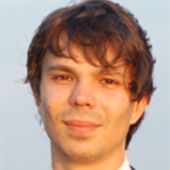
Ratmir Derda, PhD
Contact
Professor, Faculty of Science - Chemistry
- ratmir@ualberta.ca
- Phone
- (780) 492-8370
- Address
-
4-009 Centennial Ctr For Interdisciplinary SCS II
11335 Saskatchewan Drive NWEdmonton ABT6G 2H5
Overview
About
Ratmir Derda received his B.Sci. in Physics from Moscow Institute of Physics and Technology in 2001 and Ph.D. in Chemistry from the University of Wisconsin-Madison in 2008, under the supervision of Laura L. Kiessling. From 2008 to 2011, he was a postdoctoral researcher at Harvard University working under the supervision of George M. Whitesides and and Donald E. Ingber. He is currently Assistant Professor at the Department of Chemistry and Principal Investigator at the Alberta Glycomics Centre and SENTINEL Bioactive Paper Network. His recent awards include Young Investigator Award from Boulder Peptide Society (2014), University of Alberta Award for Outstanding Mentorship in Undergraduate Research & Creative Activities (2014) and Canadian Rising Star in Global Health award from Grand Challenges Canada (2011)
Research
Research Vision: My lab works at the interface of chemistry and biology. Our general areas of interest are:
Genetically-encoded libraries of small molecules for ligand discovery is enabled by our ability to synthesize million to billion-scale libraries of small molecules from genetically-encoded peptide libraries. (1) We use these libraries for development of inhibitors for therapeutically-important proteins and non-druggable proteins, with specific emphasis on proteins that recognize complex carbohydrates. (2) Our lab uses genetically-encoded libraries to develop materials that control differentiation of cells (see iCID). (3) We are interested in fundamental principles that govern selection and evolution of molecular interaction in complex selection landscapes. This knowledge will help us design ligands and probes for targets in a complex setting (receptors on the surface of the whole cell, disease-associated proteins circulating in serum, etc)
Immobilized Chemical Inducers of Differentiation (iCID) and asymmetric cell division: In living organisms, it is often the location of the molecules, not their overall concentration, that determines the cell fate. My lab develops multiple approaches for controlling spatial gradients of biomolecules in cells and differentiation of cells during cell division (aka, asymmetric division). Specifically, we investigate the differentiation events that govern tumor development and control dynamic equilibrium between tumor-initiating cancer stem cells (CSC) and non-stem cancer cells (NSCC).
Diagnostics: The Derda group is interested in developing diagnostic platforms for the point-of-care detection of bacteria, antimicrobial susceptibility or drug-resistance of cells and detection of disease biomarkers in serum.
For our recent publications see http://derda.chem.ualberta.ca/publications/
The lab welcomes students ready to learn these skills:
- Organic synthesis and genetically-encoded chemistry.
- Biochemistry, molecular cloning, and selection (phage display).
- Cell biology and cell-based high-throughput screening.
- Programming, bioinformatics, molecular modeling.
- Surface chemistry, microfabrication.
Courses
CHEM 405 - Special Topics in Chemistry
Prerequisites: a 300- level CHEM course and consent of Instructor; prerequisite courses vary, depending on topic. Course may be repeated for credit, provided there is no duplication of specific topic.
CHEM 519 - Bioanalytical Chemistry
Six week course with topics that may include antibodies, immunoassays, surface plasmon resonance, biosensors, gel electrophoresis, DNA sequencing, microscopy and imaging. Not open to students with credit in CHEM 419.
CHEM 659 - Special Topics in Chemical Biology
Six-week course with advanced discussion of selected topics in chemical biology. Course may be repeated for credit, provided there is no duplication of specific topic.